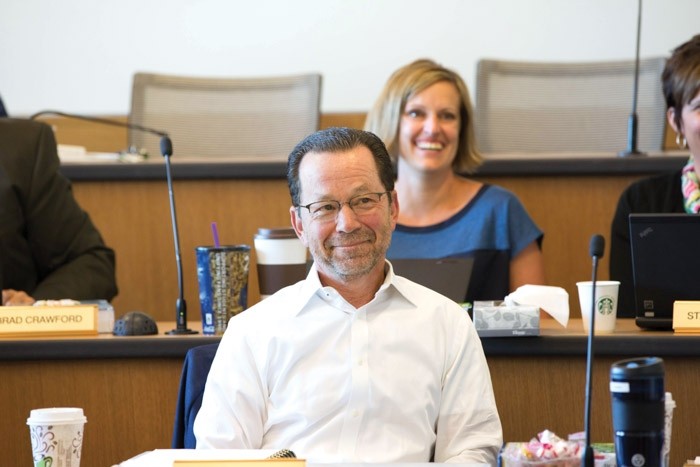Seidman College expanding EMBA
Employers investing in leadership
by Dottie Barnes
photos by Bernadine Carey-Tucker
The aging baby boomers have dominated the work force since they entered it, and will now have a profound effect as they start to exit it.
Demographics show a large number of people across the country will be retiring over the next five to 10 years, and retaining talent will be the biggest issue for companies over the next decade.
“Many companies have been talking about this for at least a year or two: what to do when Generation X retires or when there is a gap after the last of the baby boomers retire,” said Diana Lawson, dean of the Seidman College of Business. “Employers are trying to figure out how to retain talented workers, and one way is to provide training to give them the skills they need to move up in the company.”

Students in the Executive Health Care MBA share ideas; Grand Valley will soon offer a general Executive MBA.
With that in mind, the Seidman College of Business is expanding its Executive Master of Business Administration (EMBA) program. A new general EMBA is being designed to emphasize strategic thinking and leadership for sustainable growth, and structured to balance professional, family and community responsibilities.
Grand Valley currently offers an Executive Health Care MBA created in 2013 through a partnership between Grand Valley and Spectrum Health. This EMBA is designed specifically for Spectrum Health leaders and included 22 Spectrum employees in the first cohort.
“There was so much change and turbulence in the health care environment, we thought it would be beneficial for students to learn about specific health care issues and concerns that wouldn’t be addressed in a standard MBA class,” said Roger Jansen, senior vice president for System Strategy at Spectrum Health. “Our employees in the program are some of the highest performing and highest potential people, and we want them to know we are investing in them.”
After two semesters, Jansen said students are already implementing what they are learning. “Students said much of what they’ve learned has made them look at how they approach their problems and their work differently, so there has been some immediate application,” he said. “We’ve also received input and ideas from students on different directions we might want to consider as a health care system, both as a strategic direction as well as a product and services direction.”
The first cohort in the two-year EMBA program began in 2014, a second cohort started in August. It has become a successful model for a customized program for a specific organization and led to a discussion about meeting the needs of other West Michigan companies, including small- and medium-sized firms.
“We have many area companies that may want to send one or two students,” said Sridhar Sundaram, associate dean in the Seidman College of Business. “A general EMBA would help them develop the talent pool they need.”
Lawson said they found that employees who are sent to top-flight EMBA programs, like those offered at Northwestern University or the University of Chicago, will typically end up leaving their jobs. She said the hope is, by developing employees locally and integrating them into the community, they will want to stay.
The general EMBA will be structured for people who have at least five years of relevant experience and each cohort will be kept small — up to 35 students. The program will incorporate team- and project-based learning, an international trip and leadership assessment with a coach for each student.

Spectrum Health employees enrolled in the EMBA program are pictured in a classroom at the L. William Seidman Center.
“The cohort model has been very successful over many years,” said Barry Van Dyck, director of Executive Education Programs in the Seidman College of Business. “Students get to know one another and become like a small family, even socializing outside of class. Students bring in their work challenges and the whole group offers solutions. Students will be exposed to many challenges that will help them become better leaders. They will understand the bigger footprint of the economy.”
Christina Gaydou-Pittman, ’99, has been a manager of applications at Spectrum Health for the past eight years and is in the first cohort for the Executive Health Care MBA. She is responsible for managing ambulatory electronic medical records, and said the program offers a balance of great peer interaction, engaged faculty and a curriculum focused on delivering value to students, sponsors and the community.
“Being in a cohort with strong, executive leaders has been helpful as we’ve been problem solving within our day-to-day jobs,” she said. “I like the different opinions and perspectives that I’m getting to hear. I get to be a part of something that is bigger than my day-to-day work. It is eye-opening to see a bigger picture.”
Gaydou-Pittman said she and other students have been impressed with the one-on-one interaction with Grand Valley faculty and staff members. “Grand Valley has gone above and beyond to make this a stellar program,” she said. “Our professors have been very helpful, especially as we learn in areas that are new to us. We are being well prepared to continue to grow as leaders; we are being given the skills we need through a great course curriculum.”
David Wohns, a longtime cardiologist at Spectrum, is also part of the first cohort. He has worked at Spectrum since 1989 and serves as medical director of the Cardiac Catheterization Labs and Interventional Cardiology Program at the Meijer Heart Center and Spectrum Health. He said the EMBA program is well-designed, relevant and challenging.
“The benefits of the program in making me a better leader and better at my job were tangible and relatively immediate,” said Wohns. “As we face increasing financial performance pressures in health care, the finance and accounting classes gave me a foundation for more meaningful participation in my department’s finance meetings. Similarly, the economics class helped me think more deeply about the complexities of health care economics.”

Wohns said he has been enriched by the range of perspectives shared by his classmates and faculty members.
“The best part of the program is not only the exchange with students and faculty, but the thoughtfulness and expertise the faculty bring to our class and the planning that has gone into making this a great program from the start,” he said.
The goal to launch the general Executive MBA is fall 2016 or winter 2017. For more information, contact Barry Van Dyck at (616) 331-7246 or v[email protected].
